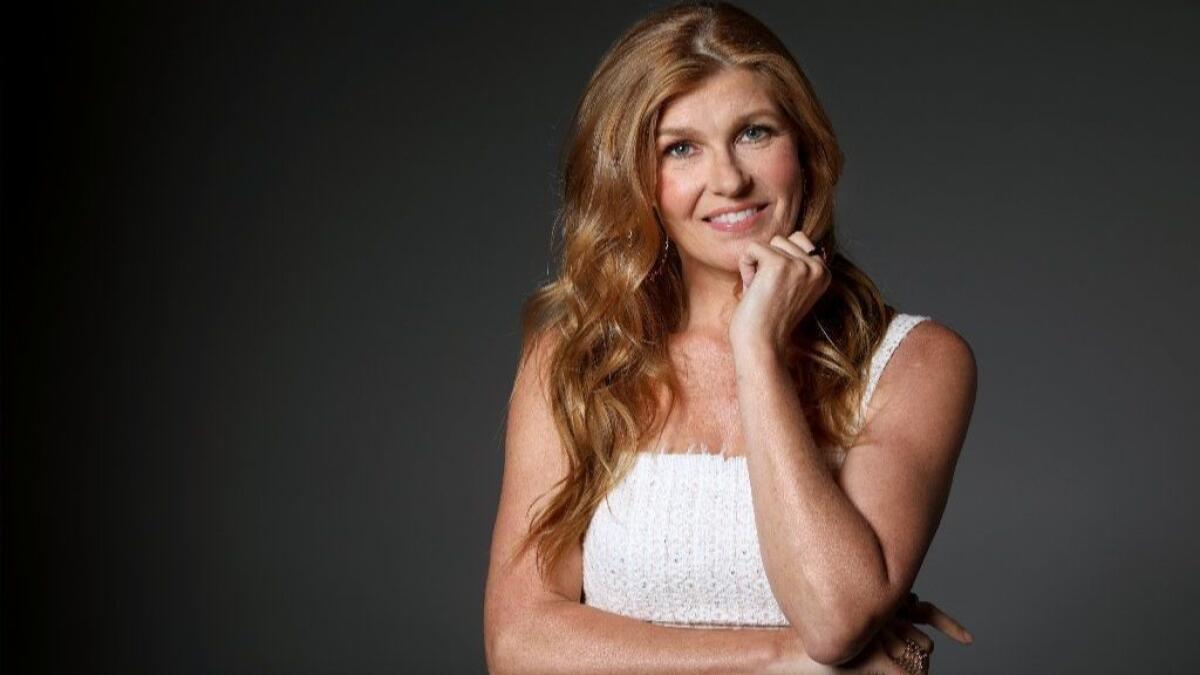Q&A: In ‘Dirty John,’ Connie Britton taps into the hunger for love behind the red flags

- Share via
In Bravo’s eight-part true-crime anthology series “Dirty John,” Connie Britton plays Debra Newell, the four-time divorcée and wealthy Newport Beach business owner who meets and falls in love with a man who is not what he seems. After marrying John Meehan (played by Eric Bana), Newell discovers her handsome new husband is actually a consummate con man whose dark and violent side ultimately brings her and her family untold grief. (His college buddies nicknamed him Dirty John.) (The story was first told as a newspaper story and podcast by Los Angeles Times reporter Christopher Goffard.)
“Being of a certain age, I actually read the newspaper article first,” Britton says. She heard friends obsess about the podcast, and when her agent emailed her soon thereafter to see if she’d heard of it, “I thought it was a kind of zeitgeist-y moment, so I read the story and I was in.”
Britton also recently wrapped her role as Beth Ailes, the wife of Fox News founder Roger Ailes, in a still-untitled film about the media mogul. She’s currently filming “Good Joe Bell” with Mark Wahlberg and Gary Sinise (another true-life story culled from the headlines).
You’re an executive producer on “Dirty John.” Can you tell us briefly some of your responsibilities and why you chose this in addition to your lead role?
Yes, it’s a vague and far-reaching title (laughs). It really depends. I was involved with this project very early on — it was basically Alex Cunningham [the writer] and then me. I’m also at a place in my career where I really love the creation of it, so that’s become a priority for me.
You met and got to know the real-life Debra Newell. What did she say when you asked her how she missed the red flags about this con man John Meehan? There were seemingly dozens from the start.
Well, first off, I never did ask her that question about missing the red flags — or what others would see as red flags. In meeting and interacting with her, my interest was in getting to know her, Debra, and to understand her and understand her real motivations, what made her do what she did, miss what she did and make the choices she made, to let her open herself and her life up to me. I’m afraid the other way would have closed her down. While I’m not a judgmental person, I certainly try to never judge the characters I play. I try to understand them, which is something different.
What would you say to the criticism that Hollywood glamorizes crime with these true-crime pieces, for example, John Meehan being played by the much more handsome Eric Bana.
I agree, no one should be glamorizing crime and criminals. But what these projects and stories do, I hope, is tell stories of people’s motivations and impulses — good and bad — and let people watch and understand these kind of events better, as well as be entertained. And, yes, Eric Bana is a very handsome man, but part of John’s allure as a con man was his good looks.
It’s interesting how Debra was such a successful and savvy entrepreneur in a competitive business yet could be so easily conned in her personal life.
I think Debra would readily admit this is her Achilles’ heel, the romance part. That dichotomy is part of what’s interesting. We all have influences that teach us how to feel about ourselves. She was taught that you need a man to be happy. That’s what her family and culture and environment told and taught her.
But I think if you asked her about [her first stages of her relationship with John], she felt, “OK, I’m in this relationship that makes me happy and feel good about myself and this time I’m putting myself first and not after my children.” She felt she was in fact empowering herself, which is the irony. And, of course, this is exactly what the con man sees and zooms in on and goes after, to satisfy that need. It’s denial, and denial is a strong thing; and unfortunately her reality had a lot of denial in it.
The clothes you wore in the series were beautiful; were you involved in the costuming?
So that’s a good example of the executive producer role; I was able to bring on Susie DeSanto, our costume designer on “Nashville.” On “Nashville,” we’d joke, it’s rhinestones and more-is-more, and to a degree it’s the same on “Dirty John,” because there’s a real lushness to the way these women in Orange County dress and present themselves. It was really fun to go down that road. [The costumes are] based 100% on the way Debra dresses. In fact, Debra purchased and then wore to the premiere the same dress I wore on the pilot — so I feel we really nailed it!
More to Read
From the Oscars to the Emmys.
Get the Envelope newsletter for exclusive awards season coverage, behind-the-scenes stories from the Envelope podcast and columnist Glenn Whipp’s must-read analysis.
You may occasionally receive promotional content from the Los Angeles Times.










